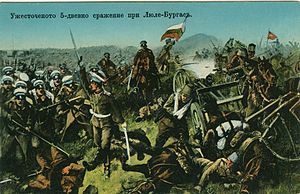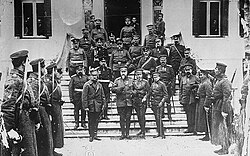
Back Balkanoorloë Afrikaans حروب البلقان Arabic Guerres de los Balcanes AST Balkan müharibələri Azerbaijani بالکان ساواشلاری AZB Балҡан һуғыштары Bashkir Балканскія войны Byelorussian Балканскія войны BE-X-OLD Балкански войни Bulgarian Brezelioù balkanek Breton
| Balkan Wars | |||||||
|---|---|---|---|---|---|---|---|
 A Bulgarian postcard depicting the Battle of Lule Burgas. | |||||||
| |||||||
| Belligerents | |||||||
| First Balkan War: |
First Balkan War: | ||||||
|
Second Balkan War: |
Second Balkan War: | ||||||
| Commanders and leaders | |||||||
|
| |||||||
| Strength | |||||||
|
|
1,093,800 men | ||||||
|
| |||||||
| Events leading to World War I |
|---|
 |
|
The Balkan Wars were a series of two conflicts that took place in the Balkan states in 1912 and 1913. In the First Balkan War, the four Balkan states of Greece, Serbia, Montenegro and Bulgaria declared war upon the Ottoman Empire and defeated it, in the process stripping the Ottomans of their European provinces, leaving only Eastern Thrace under Ottoman control. In the Second Balkan War, Bulgaria fought against the other four original combatants of the first war. It also faced an attack from Romania from the north. The Ottoman Empire lost the bulk of its territory in Europe. Although not involved as a combatant, Austria-Hungary became relatively weaker as a much enlarged Serbia pushed for union of the South Slavic peoples.[6] The war set the stage for the July crisis of 1914 and thus served as a prelude to the First World War.[7]
By the early 20th century, Bulgaria, Greece, Montenegro and Serbia had achieved independence from the Ottoman Empire, but large elements of their ethnic populations remained under Ottoman rule. In 1912, these countries formed the Balkan League. The First Balkan War began on 8 October 1912, when the League member states attacked the Ottoman Empire, and ended eight months later with the signing of the Treaty of London on 30 May 1913. The Second Balkan War began on 16 June 1913, when Bulgaria, dissatisfied with its loss of Macedonia, attacked its former Balkan League allies. The combined forces of Serbian and Greek armies, with their superior numbers repelled the Bulgarian offensive and counter-attacked Bulgaria by invading it from the west and the south. Romania, having taken no part in the conflict, had intact armies to strike with and invaded Bulgaria from the north in violation of a peace treaty between the two states. The Ottoman Empire also attacked Bulgaria and advanced in Thrace, regaining Adrianople. In the resulting Treaty of Bucharest, Bulgaria managed to regain most of the territories it had gained in the First Balkan War. However, it was forced to cede the ex-Ottoman south part of Dobruja province to Romania.[8]
The Balkan Wars were marked by ethnic cleansing, with all parties being responsible for grave atrocities against civilians, and inspired later atrocities including war crimes during the 1990s Yugoslav Wars.[9][10][11][12]
- ^ a b McCarthy, Justin. "1912–1913 Balkan Wars, Death and Forced Exile of Ottoman Muslims" (PDF). tc-america.org.
- ^ a b Hupchick, Dennis P., The Balkans: From Constantinople to Communism. p. 321.
- ^ a b Alpion, Gëzim (2021). Mother Teresa: The Saint and Her Nation. Bloomsbury. pp. 11, 19. ISBN 978-9389812466.
- ^ Ke, Jing. "Change the Hostile Other into Ingroup Partner: On the Albanian-Serb Relations" (PDF). Kosovo Public Policy Center: 83.
120,000–270,000 Albanians were killed and approximately 250,000 Albanians were expelled between 1912 and 1914.
- ^ Qirezi, Arben (2017). "Settling the self-determination dispute in Kosovo". In Mehmeti, Leandrit I.; Radeljić, Branislav (eds.). Kosovo and Serbia: Contested Options and Shared Consequences. University of Pittsburgh Press. ISBN 978-0822981572.
- ^ Clark 2013, pp. 45, 559.
- ^ Hall 2000.
- ^ Winston Churchill (1931). The World Crisis, 1911–1918. Thornton Butterworth. p. 278.
- ^ Biondich, Mark (20 October 2016). "The Balkan Wars: violence and nation-building in the Balkans, 1912–13". Journal of Genocide Research. 18 (4): 389–404. doi:10.1080/14623528.2016.1226019. S2CID 79322539. Retrieved 10 April 2022.
- ^ Levene, Mark (2018). "'The Bulgarians Were the Worst!' Reconsidering the Holocaust in Salonika within a Regional History of Mass Violence". The Holocaust in Greece. Cambridge University Press. p. 54. ISBN 978-1-108-47467-2.
- ^ Farrar, L L Jr. (2003). "Aggression versus apathy: The limits of nationalism during the Balkan Wars, 1912–1913". East European Quarterly. 37 (3): 257–280. ProQuest 195176627.
- ^ Michail, Eugene (2017). "The Balkan Wars in Western Historiography, 1912–2012". The Balkan Wars from Contemporary Perception to Historic Memory. Springer International Publishing. pp. 319–340. ISBN 978-3-319-44642-4.